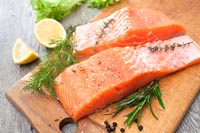Selecting the Right Fish for Your Health
/Fish and shellfish are low in fat, high in protein, and good sources of iodine, vitamin D, and selenium—nutrients often deficient in the American diet. Many fish are rich in “good fats,” particularly polyunsaturated omega-3 fatty acids. The two most beneficial types of fats, DHA (docosahexaenoic acid) and EPA (eicosapentaenoic acid), have been shown to reduce inflammation and severity of heart and retinal diseases. Research shows that children born to mothers who ate low-mercury seafood during pregnancy experienced better functioning brain and nervous systems. Additionally, a diet rich in omega-3s has been shown to lower blood triglycerides and decrease the risk of sudden death from heart disease.
Despite these benefits, there is cause for concern. Decades of industrial activity have contaminated our waterways with mercury and other pollutants. These contaminants end up in seafood. While most commercial fish and shellfish contain some mercury, concentrations vary depending on the age of the fish, region of harvest, and diet (e.g., predators such as sharks eat smaller fish that accumulate mercury).
Which Fish Are the Healthiest?
Which fish are richest in healthy omega-3 fatty acids and low in mercury? You’re not going to find that information in the grocery store, but the Environmental Working Group provides an extensive analysis of seafood. Their consumer-friendly guidelines illustrate which fish are safest/healthiest to eat and which fish to avoid.
Here’s a summary of their listing to help you incorporate more of the right kind of seafood into your diet:
- Very high omegas, low mercury: wild salmon, sardines, mussels, rainbow trout, Atlantic mackerel
- High omegas, low mercury: oysters, anchovies, herring
- Low mercury, lower omegas: shrimp, catfish, tilapia, swai, clams, scallops
- Increasing levels of mercury: canned light and albacore tuna, halibut, mahi mahi, sea bass
- Avoid*: shark, swordfish, marlin, king mackerel, tilefish
* FDA advisory organizations recommend pregnant women and children never eat these species.
Resources
- Consumer Lab. “Product Review: Fish Oil and Omega-3 Fatty Acid Supplements Review (Including Krill, Algae, and Calamari Oil).” Updated February 2015.
- Environmental Working Group. “EWG’s Consumer Guide to Seafood.” September 18, 2014.
- Food and Drug Administration. “Mercury Levels in Commercial Fish and Shellfish (1990-2010).” Updated October 2014.
- Food and Drug Administration and Environmental Protection Agency. “Fish: What Pregnant Women and Parents Should Know.” Draft. June 2014.
Image Attribution: alexraths/bigstock.com

